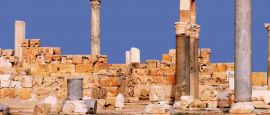Libya History, Language and Culture
History of Libya
From the eighth century BC onwards when the Phoenicians settled Libya has been conquered several times over – its archaeological heritage includes both Greek and Roman remains.
Under UN direction, the country was granted full independence in 1951 and King Idris became head of state, pursuing a pro-Western foreign policy while keeping up cordial relations with other Arab states. During the 1950s and 1960s, major discoveries of oil greatly improved the economic prospects of the country.
Idris was overthrown by a military coup lead by Colonel Muammar Gaddafi in 1969 and in the 1980s and 1990s Libya was ostracised from the international community because of Gaddafi’s support for various revolutionary and terrorist groups, most notably the 1988 bombing of the Pan Am flight over the Scottish town of Lockerbie that killed all 270 passengers on board. UN sanctions were imposed from 1992, a measure that cost Libya billions of dollars in revenue, but when Gaddafi announced in 2003 that he would give up his nuclear weapons, sanctions were lifted and in 2006 Libya was rehabilitated and taken off the US list of states sponsoring terrorism.
In 2011, as part of the Arab Spring that took place across many of the Middle East and northern African countries, there was a widespread uprising against Colonel Gaddafi’s rule, resulting in civil war. Libyan forces loyal to the transitional council, supported by NATO forces, were eventually successful in their aims, resulting in the unseating Colonel Gaddafi in October 2011 and his death at the hands of his own people. Under Gaddafi a multi-party state was forbidden, but dozens of new parties have sprung up in the wake of the revolution, including the Muslim Brotherhood and the Salafis.
A Libyan General National Congress was elected in 2012, then dissolved after the June 2014 elections, but reconvened by a minority of its members. The country’s Council of Deputies also claimed to be the legitimate government and some areas of the country fell beyond either group’s control. Following UN-sponsored peace talks between the factions the Government of National Accord was formed and entered Tobruk in April 2016. Elections are due to be held within two years.
Did you know?
• There is little or no pop music in Libya, although various kinds of Arab music are popular and the Tuareg people have their own folk music.
• There has been a Jewish community in Libya since the third century BC – Simon of Cyrene, a Libyan Jew, is believed to have helped Jesus carry the cross.
• In the 16th century the Knights of St John occupied Tripoli until it was besieged by the Ottomans in 1551.




 You know where
You know where